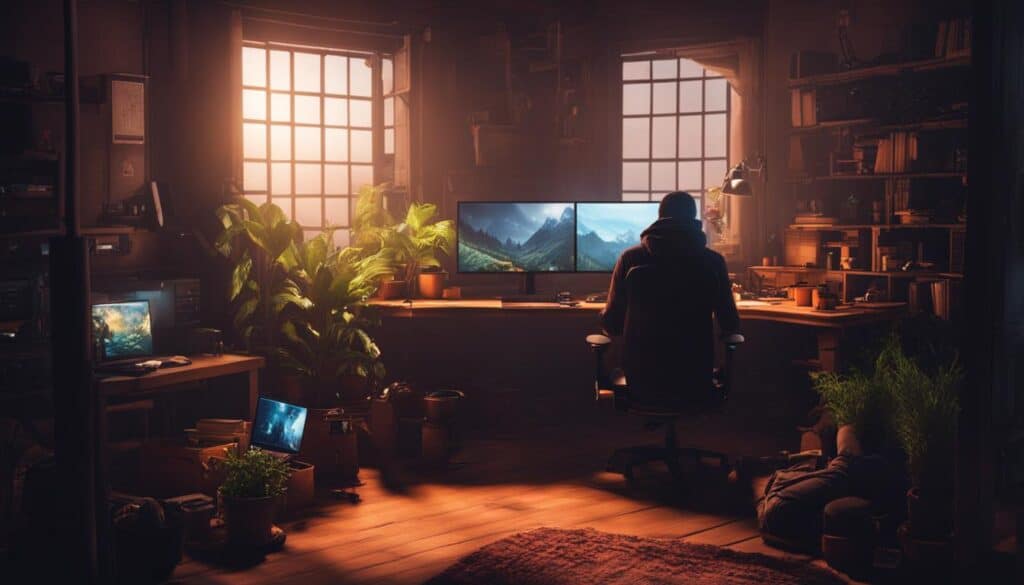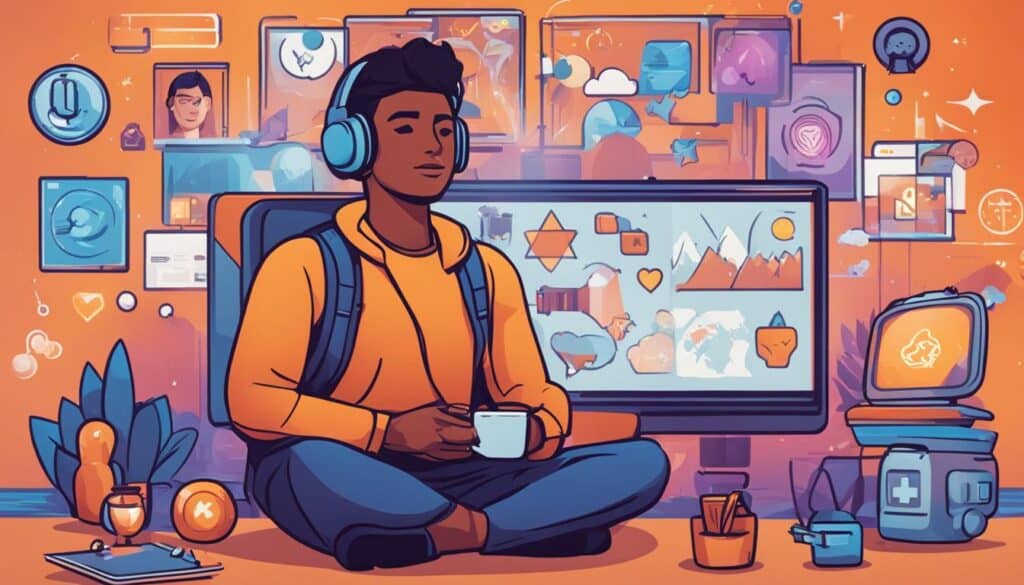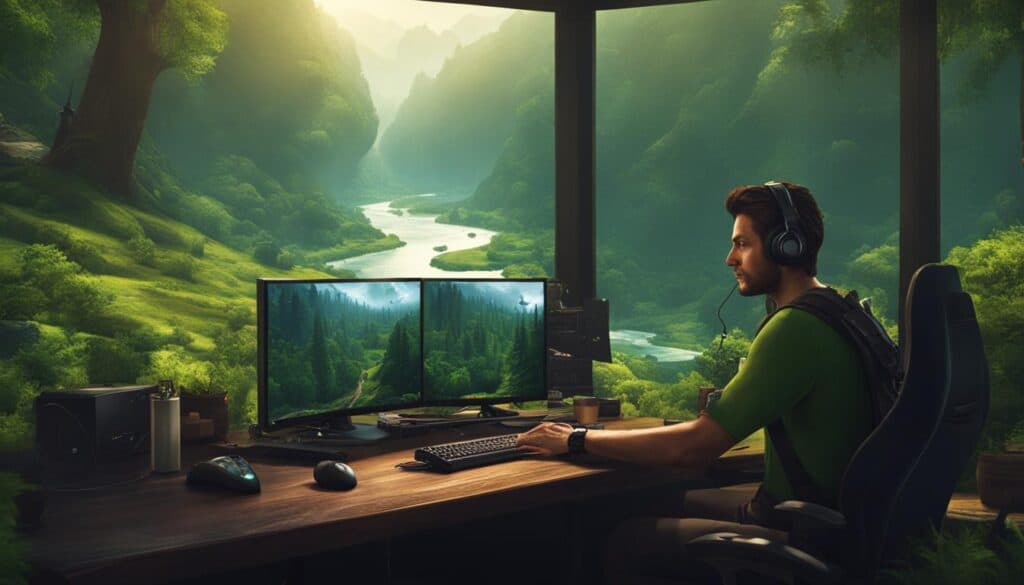The correlation between gaming and mental health has become a topic of increasing concern. As the popularity of video games continues to rise, there is a growing need to understand and address the mental health challenges faced by gamers. This article explores the impact of gaming on mental well-being and provides insights into how to support the gaming community.
Key Takeaways:
- Gaming can have both positive and negative effects on mental health.
- Excessive gaming can lead to increased stress, anxiety, and depression.
- Gaming addiction is a recognized disorder and should be treated as such.
- Encouraging healthy gaming habits and creating supportive communities are essential for promoting better mental well-being.
- Raising awareness, educating, and advocating for policy change can contribute to a healthier gaming culture.
The Effects of Gaming on Mental Health

Gaming has become an integral part of many people’s lives, offering entertainment, excitement, and a sense of community. However, it’s important to recognize that excessive gaming can have negative effects on mental health. Several studies have shown a correlation between gaming and increased levels of stress, anxiety, and depression. The immersive nature of video games, coupled with long hours of screen time, can contribute to feelings of social isolation and a decline in overall well-being.
Despite these negative effects, it’s important to note that gaming can also have positive impacts on mental health. Many gamers find solace and stress relief in the virtual world, using gaming as a form of escape or relaxation. Additionally, video games can provide cognitive stimulation, helping to improve problem-solving skills, memory, and concentration. Gaming can also foster a sense of community, allowing individuals to connect with like-minded people and build social relationships.
It’s crucial to strike a balance between gaming and other aspects of life to maintain good mental health. Taking regular breaks, engaging in physical activity, and setting limits on screen time are essential practices for promoting positive gaming habits. By prioritizing self-care and incorporating other hobbies and social interactions into daily routines, gamers can enhance their overall well-being and reduce the likelihood of negative mental health consequences.
Gaming Addiction: An Unhealthy Obsession

While gaming can be an enjoyable and immersive form of entertainment, it’s important to recognize that excessive gaming can lead to addiction. Gaming addiction is a recognized disorder characterized by an uncontrollable compulsion to play video games. It can have severe consequences on mental health, leading to social and occupational dysfunction.
There are several factors that contribute to gaming addiction. For some individuals, gaming provides an escape from real-life stressors or a way to cope with negative emotions. It can also offer a sense of social connection and accomplishment, as many games have competitive elements and online communities. The rewarding nature of video games, with their leveling up systems and achievement rewards, can also reinforce addictive behaviors.
It’s important for gamers and their loved ones to be aware of the signs of gaming addiction. Some common symptoms include a preoccupation with gaming, loss of interest in other activities, difficulty controlling the amount of time spent gaming, and continued gaming despite negative consequences. If you or someone you know is struggling with gaming addiction, it’s essential to seek professional help. Therapists, counselors, and addiction specialists can provide guidance and support tailored to the specific needs of gamers.
“Gaming addiction is a serious issue that can have a profound impact on mental health and overall well-being. It’s crucial for individuals to recognize the signs of addiction and seek help when needed.”
The road to recovery from gaming addiction involves therapy, support groups, and implementing healthier gaming habits. It’s important to establish a balance between gaming and other aspects of life, such as work, relationships, and physical activity. Setting limits on screen time, taking regular breaks, and engaging in alternative hobbies can help break the cycle of addiction. By addressing gaming addiction head-on and seeking professional help, individuals can regain control of their lives and improve their mental well-being.
Promoting Positive Gaming Habits

When it comes to gaming and mental health, promoting positive gaming habits is essential. By encouraging healthy behaviors and responsible gaming practices, we can mitigate the potential negative effects on mental well-being. Here are some strategies to support a healthier gaming experience:
- Set limits on screen time: It’s important to establish boundaries and allocate dedicated time for gaming while also making time for other activities and commitments. This can help prevent excessive gaming and maintain a balanced lifestyle.
- Take regular breaks: Engaging in gaming marathons without breaks can lead to fatigue and increased stress levels. Make it a habit to take short breaks every hour, stretch, and engage in activities that promote physical and mental well-being.
- Engage in physical activity: Gaming often involves a sedentary lifestyle, which can have negative impacts on overall health. Incorporating regular exercise or physical activities outside of gaming can improve mood, reduce stress, and enhance cognitive function.
Building a balanced lifestyle that includes other hobbies and social interactions outside of gaming is also crucial for maintaining good mental health. Dedicating time to activities such as reading, art, or spending time with friends and family can provide a sense of fulfillment and prevent excessive reliance on gaming as a coping mechanism.
Lastly, educating gamers and their families about responsible gaming practices and providing resources for support is essential. This can involve promoting awareness of potential risks associated with excessive gaming, teaching strategies for managing gaming time, and directing individuals to organizations or helplines that specialize in gaming addiction and mental health support.
Creating Supportive Gaming Communities

Gaming communities play a crucial role in supporting the mental health of gamers. By fostering a sense of belonging and providing a safe space for individuals to connect and share their experiences, these communities can help combat feelings of isolation and promote overall psychological wellness.
One way to create supportive gaming communities is through online forums and social platforms that are dedicated to promoting well-being. These platforms provide a space for gamers to discuss their challenges, seek advice, and connect with others who share similar experiences. By encouraging open and honest conversations about mental health, these communities help break down stigmas and ensure that gamers feel heard and understood.
Game developers also have the power to contribute to supportive gaming communities. By incorporating mental health features and resources within their games, they can raise awareness and provide players with tools to monitor and manage their mental well-being. This can include features like in-game reminders to take breaks, access to resources for mental health support, and even mini-games that promote relaxation and stress relief.
Overall, creating supportive gaming communities is essential for promoting positive mental health within the gaming world. By fostering a sense of belonging, providing resources for support, and incorporating mental health features within games, we can build a culture that prioritizes the well-being of gamers and helps them thrive.
Seeking Professional Help
When it comes to gaming addiction or other mental health issues related to gaming, seeking professional help is crucial. Therapists, counselors, and addiction specialists have the expertise to provide guidance and support tailored to the specific needs of gamers. Whether it’s addressing gaming addiction, managing the impact of excessive screen time, or coping with stress and anxiety, these professionals can offer valuable insights and strategies for improving mental well-being.
If you or someone you know is struggling with gaming addiction or experiencing negative mental health effects, don’t hesitate to reach out for help. There are online resources and helplines available to provide assistance and information to those seeking support. Remember, seeking help is a sign of strength and can lead to positive changes in mental well-being.
“Reaching out for help is an important step towards healing and finding a healthier balance in life. By working with a professional, individuals can receive the necessary support and guidance to overcome gaming addiction and improve their overall mental well-being.”
Take control of your mental health by seeking the help you need. Reach out to a qualified professional who understands the unique challenges faced by gamers and can provide the support necessary for a healthier gaming experience.
Where to Find Help:
- National Helpline for Gaming Addiction: 1-800-GAMER-HELP
- Online resources: www.gamingaddictionhelp.org
- Local mental health clinics and counseling centers
Raising Awareness and Education
In order to address the mental health challenges faced by gamers, it is crucial to raise awareness and educate both gamers and the wider community. By increasing knowledge and understanding, we can create a more supportive and empathetic environment for gamers.
1. Educational Campaigns and Workshops
Educational campaigns and workshops can play a vital role in raising awareness about the potential mental health effects of gaming. These initiatives can provide gamers, their families, and the general public with valuable information on the impact of gaming on mental well-being. By increasing knowledge about the signs of gaming addiction and providing resources for support, we can empower individuals to make informed decisions about their gaming habits.
2. Resources and Support
Creating and disseminating resources for gamers is essential in promoting mental health in the gaming community. Online platforms, helplines, and support groups can provide assistance and information to those seeking help for gaming addiction or other mental health issues related to gaming. By making these resources easily accessible, we can ensure that gamers have the support they need to maintain their mental well-being.
3. Destigmatizing Mental Health
Destigmatizing mental health challenges in the gaming community is crucial for creating a more inclusive and supportive environment. By promoting understanding and empathy, we can encourage gamers to seek help when needed and foster a culture that prioritizes mental well-being. This includes challenging negative stereotypes and misconceptions surrounding gaming and mental health and promoting open dialogue about these issues.
The Role of Game Developers and Industry
Game developers and the gaming industry play a crucial role in promoting the mental well-being of gamers. By implementing measures to prevent gaming addiction, promoting positive gaming habits, and addressing mental health themes within games, they can contribute to a healthier gaming culture.
Collaborating with mental health professionals and organizations is essential in ensuring that games support and enhance mental well-being. By incorporating mental health features and resources, game developers can create games that not only entertain but also provide valuable tools for managing mental health.
It is the responsibility of the gaming industry to prioritize player well-being. By taking an active role in promoting mental health, game developers and industry leaders contribute to the overall health and happiness of the gaming community.
Gaming Mental Health Advocacy: Towards Policy Change
The gaming industry has witnessed tremendous growth in recent years, attracting millions of players worldwide. However, with this rise in popularity comes the need to address the mental health challenges faced by gamers. Recognizing the impact of gaming on mental well-being, it is crucial to advocate for policy change that prioritizes the mental health of gamers.
Research has highlighted the link between excessive gaming and mental health issues such as stress, anxiety, and depression. By incorporating mental health education into school curricula, we can raise awareness about the potential risks and provide young gamers with the necessary knowledge to maintain a healthy gaming lifestyle. Allocating resources for research and support services will further enable us to better understand and address the unique mental health needs of the gaming community.
“The mental health of gamers should be a top priority for policymakers,” emphasizes Dr. Jane Simmons, a leading expert in gaming and psychology. “By regulating the gaming industry to promote player well-being, we can ensure that games are designed with mental health in mind and that harmful practices, such as loot boxes, are minimized.”
Advocacy groups and organizations play a vital role in driving policy change and creating a more inclusive environment for gamers. By collaborating with these groups, policymakers can gain valuable insights and develop policies that address the mental health concerns of gamers effectively. Together, we can build a future where gamers are supported, empowered, and able to enjoy the benefits of gaming without compromising their mental well-being.
The Future of Gaming and Mental Health
As the gaming industry continues to evolve, there is a growing recognition of the importance of mental health in gaming. Developers and researchers are actively exploring innovative ways to integrate mental health support within the gaming experience. Virtual reality therapy is gaining traction as a promising tool, allowing players to immerse themselves in therapeutic environments and engage in guided interventions for mental well-being.
Furthermore, mental health-focused games are being developed to address specific issues such as anxiety and stress management. These games provide players with interactive experiences that promote mindfulness, relaxation, and emotional regulation. By incorporating evidence-based techniques and gamification elements, mental health games have the potential to empower players to take control of their mental well-being while enjoying the gaming experience.
Research and innovation in the field of gaming and mental health are expected to continue, leading to more targeted interventions and personalized support. This includes the development of intelligent systems that can monitor player behavior and emotions, providing real-time feedback and adaptive gameplay. By leveraging the power of technology and psychology, the future of gaming holds great potential in enhancing mental well-being and promoting a positive gaming experience for all.
Conclusion
The impact of gaming on mental health is an important topic that requires attention and action. By acknowledging the effects of gaming on mental well-being, we can work towards creating a healthier gaming culture. Excessive gaming has been linked to increased stress, anxiety, and depression, but it’s important to note that gaming can also have positive effects, such as stress relief and cognitive stimulation.
To promote positive gaming habits, it’s crucial to set limits on screen time and engage in physical activity. Building a balanced lifestyle that includes other hobbies and social interactions outside of gaming is also key. Educating gamers and their families about responsible gaming practices and providing resources for support can contribute to better mental well-being.
Creating supportive gaming communities is essential. Online forums, gaming clubs, and social platforms dedicated to promoting well-being and providing a safe space for gamers to connect can make a significant difference. Game developers also play a role by incorporating mental health features and resources within their games. By fostering an inclusive and supportive environment, gamers can feel empowered to address their mental health concerns.
Seeking professional help is crucial for individuals struggling with gaming addiction or other mental health issues related to gaming. Therapists, counselors, and addiction specialists can provide guidance and support tailored to the specific needs of gamers. Online resources and helplines are also available to provide assistance and information.
FAQ
What are the effects of gaming on mental health?
Excessive gaming can lead to increased stress, anxiety, and depression. It can also result in social isolation and a decline in overall well-being due to excessive screen time and a lack of physical activity. However, gaming can also have positive effects on mental health, such as providing a sense of community, stress relief, and cognitive stimulation.
What is gaming addiction?
Gaming addiction is a recognized disorder characterized by excessive and compulsive gaming. It can have severe consequences on mental health, leading to social and occupational dysfunction. Factors that contribute to gaming addiction include escapism, social connection, and the rewarding nature of video games. Treatment options for gaming addiction include therapy, support groups, and implementing healthier gaming habits.
How can I promote positive gaming habits?
You can promote positive gaming habits by setting limits on screen time, taking regular breaks, and engaging in physical activity. It’s also important to build a balanced lifestyle that includes other hobbies and social interactions outside of gaming. Educating yourself and your family about responsible gaming practices and providing resources for support can contribute to better mental well-being.
How can I create a supportive gaming community?
You can create a supportive gaming community by participating in online forums, joining gaming clubs, and connecting with others on social platforms dedicated to promoting well-being. Game developers can also play a role by incorporating mental health features and resources within their games to foster an inclusive and supportive environment.
Where can I seek professional help for gaming addiction or mental health issues related to gaming?
If you’re struggling with gaming addiction or other mental health issues related to gaming, it’s important to seek professional help. Therapists, counselors, and addiction specialists can provide guidance and support tailored to the specific needs of gamers. Online resources and helplines are also available to provide assistance and information to those seeking help.
How can we raise awareness about the mental health effects of gaming?
Raising awareness can be done through educational campaigns, workshops, and seminars aimed at gamers, their families, and the wider community. Increasing knowledge about the signs of gaming addiction and providing information on available resources can help individuals make informed decisions about their gaming habits. By promoting understanding and destigmatizing mental health challenges in the gaming world, we can create a more supportive and empathetic community.
What can game developers and the gaming industry do to prioritize mental well-being?
Game developers and the gaming industry have a responsibility to prioritize the mental well-being of gamers. This includes implementing measures to prevent gaming addiction, promoting positive gaming habits, and addressing mental health themes within games. Collaborating with mental health professionals and organizations can ensure the development of games that support and enhance mental well-being.
How can we advocate for policy change regarding gaming and mental health?
Advocacy groups and organizations can play a crucial role in raising awareness, lobbying for change, and creating a more inclusive and supportive environment for gamers. Policy change is necessary to address the mental health challenges faced by gamers, such as incorporating mental health education into school curricula, allocating resources for research and support services, and regulating the gaming industry to prioritize player well-being.
What does the future of gaming and mental health look like?
As the gaming industry continues to evolve, there is a growing recognition of the importance of mental health in gaming. This is reflected in the development of mental health-focused games, virtual reality therapy, and the integration of mental health features within gaming platforms. Ongoing research and innovation will contribute to a better understanding of the relationship between gaming and mental health, leading to more targeted interventions and support.
 Online Gaming Circuit
Online Gaming Circuit




